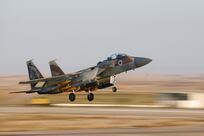Dubai // The West may have informed many of the good aspects of progress in the UAE, but encouraging mothers to switch from breast feeding to using baby formula, say experts, was not one of them. However, a return to the natural way of doing things - one prescribed in the Quran itself - has been gathering steam in recent years and will be highlighted from today as part of National Breastfeeding Week. A number of activities have been organised around the country leading up to the second regional Lactation Conference at the InterContinental Resort in Al Ain, a two-day event beginning on Friday.
Wendy al Rubaie is a retired midwife and one of the founding members of Breastfeeding Friends, the first such support group in the UAE. It began 10 years ago and now operates under the Supreme Council for Family Affairs in Sharjah. "Emirati culture used to be natural - but not any more," she said. "Since the advent of formula and people having nannies - they give their babies formula. Society has changed its perspective."
Much has been done to effect a change: the Ministry of Health now supports six months of exclusive breastfeeding and nine out of more than 20 government hospitals and dozens of private facilities have been approved under the joint World Health Organisation - Unicef "Baby Friendly Hospital Initiative", designed so hospitals can promote breastfeeding from birth. Another two hospitals are almost ready for their appraisals. The UAE has 300 lactation consultants out in the community to provide encouragement to women and help with any problems. The first consultants were trained in 2001.
Breastfeeding is essential for the health of babies, said Dr Hajer al Hosani, the director of maternal and child health for the UAE. It gives them nutrient-rich colostrum, the first milk infants ingest, and provides their first vaccines. That is why the National Breastfeeding Programme was established in 1992, encouraging women to breastfeed exclusively for six months, and to continue with natural feeding, with the addition of other food, for two years, she said.
Dr Mariam Amirrad, a consultant paediatrician working in Al Baraha Hospital in Deira, one that has become baby-friendly under the WHO/Unicef initiative, said education was the key. "In our hospital we are teaching the mothers, but teaching in the hospital is not enough," she said. "We need more ante-natal classes in this country discussing breastfeeding. From the beginning of their pregnancy, they should be educated," she said.
However, the biggest difficulty, she added, is overcoming fierce marketing and advertising by companies that make baby formula. "This marketing has a big role. The companies tell you that the feed they offer you is great for the brain of your child." There is also some misunderstanding, especially among young first-time mothers, that breastfeeding will interfere with their daily routine. "We have highly educated mothers who refuse to feed because they think [it] will interfere with work or study," she said. "But we tell them, for example, you can express it and keep it in the fridge."
While there are lactation clinics and support groups, the UAE lacks an official community support programme such as those that exist in some western countries. But Mrs al Rubaie believes a cultural shift back to what is natural is possible: "It's improving," she said. "Believe me, it's improving." amcqueen@thenational.ae * With additional reporting by Anealla Safdar




